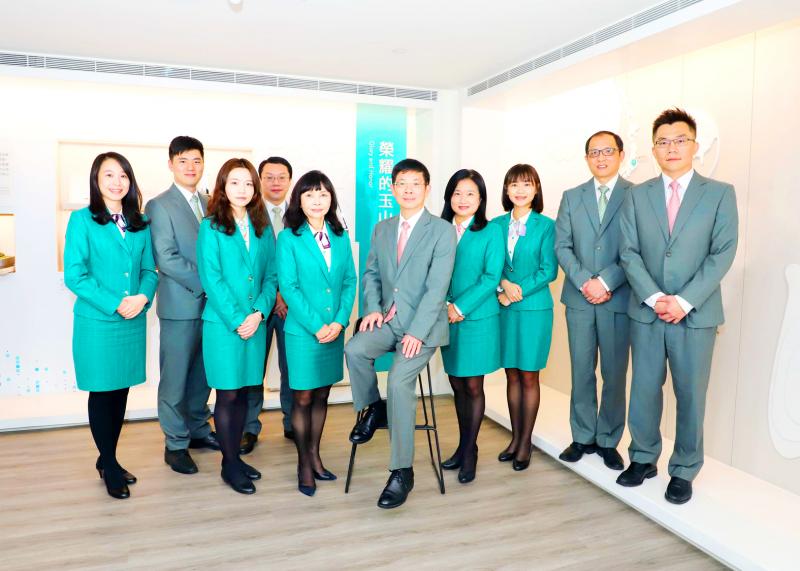Sustainalytics, a world-leading environmental, social and governance (ESG) research institution, has assigned an ESG rating to E.Sun Financial Holding Co (玉山金控).
In the latest Sustainalytics ESG Risk Ratings, E.Sun was ranked first in Asia and second worldwide among 386 companies in the “diversified banks” industry.
This is one of the best performances of any Taiwanese bank in international ESG evaluations.

Photo courtesy of E.Sun Financial Holding Co
E.Sun is ranked in the top 10 worldwide across several rated ESG risk material issues, including business ethics, data privacy and security, human capital, and ESG integration.
Especially, E.Sun was ranked first in the “product governance” risk issue category.
Sustainalytics is also positive about E.Sun’s ESG management, which was rated “strong.”
The improvement of E.Sun’s ESG management score is the main reason that it advanced in the rankings this year.
Sustainalytics said E.Sun has strong ESG reporting practices and that a board committee has been appointed to oversee ESG issues.
The ESG rating report also said that E.Sun has a strong environmental policy and has established adequate standards on social supply chain issues.
In addition, E.Sun also has set up a strong whistle-blower program, the report said.
Headquartered in the Netherlands, Sustainalytics was founded in 1992. It is among the best-known ESG research institutions in the world. It periodically evaluates environment, society and governance for corporations around the world.
The results are widely adopted by many asset management companies for research purposes. Sustainalytics is a member of Morningstar Group.
“E.Sun is dedicated to integrating itself with international standards and best ESG practices of the world,” E.Sun Commercial Bank (玉山銀行) chairman Joseph N.C. Huang (黃男州) said. “E.Sun will not only proactively incorporate ESG into banking, but will also continue to collaborate with partners to amplify positive impacts.”
With regard to climate change, E.Sun took the lead among its Taiwanese peers to join the Task Force on Climate-related Financial Disclosures.
E.Sun used scientific methods to quantify the financial effects of climate change to manage its associated risks.
This year, E.Sun further invited outstanding Taiwanese corporations to join its E.Sun ESG Initiative, under which participating companies committed to taking action against climate change.
E.Sun is ranked first in Taiwan’s financial sector by many international ESG rating institutions, such as the Dow Jones Sustainability Index, MSCI ESG and FTSE4Good.
E.Sun’s long-term involvement in ESG has shown good results.
E.Sun said it would continue to work together with customers, shareholders and employees to make more positive impacts and create greater value for the society.

Intel Corp chief executive officer Lip-Bu Tan (陳立武) is expected to meet with Taiwanese suppliers next month in conjunction with the opening of the Computex Taipei trade show, supply chain sources said on Monday. The visit, the first for Tan to Taiwan since assuming his new post last month, would be aimed at enhancing Intel’s ties with suppliers in Taiwan as he attempts to help turn around the struggling US chipmaker, the sources said. Tan is to hold a banquet to celebrate Intel’s 40-year presence in Taiwan before Computex opens on May 20 and invite dozens of Taiwanese suppliers to exchange views

Application-specific integrated circuit designer Faraday Technology Corp (智原) yesterday said that although revenue this quarter would decline 30 percent from last quarter, it retained its full-year forecast of revenue growth of 100 percent. The company attributed the quarterly drop to a slowdown in customers’ production of chips using Faraday’s advanced packaging technology. The company is still confident about its revenue growth this year, given its strong “design-win” — or the projects it won to help customers design their chips, Faraday president Steve Wang (王國雍) told an online earnings conference. “The design-win this year is better than we expected. We believe we will win

Chizuko Kimura has become the first female sushi chef in the world to win a Michelin star, fulfilling a promise she made to her dying husband to continue his legacy. The 54-year-old Japanese chef regained the Michelin star her late husband, Shunei Kimura, won three years ago for their Sushi Shunei restaurant in Paris. For Shunei Kimura, the star was a dream come true. However, the joy was short-lived. He died from cancer just three months later in June 2022. He was 65. The following year, the restaurant in the heart of Montmartre lost its star rating. Chizuko Kimura insisted that the new star is still down

While China’s leaders use their economic and political might to fight US President Donald Trump’s trade war “to the end,” its army of social media soldiers are embarking on a more humorous campaign online. Trump’s tariff blitz has seen Washington and Beijing impose eye-watering duties on imports from the other, fanning a standoff between the economic superpowers that has sparked global recession fears and sent markets into a tailspin. Trump says his policy is a response to years of being “ripped off” by other countries and aims to bring manufacturing to the US, forcing companies to employ US workers. However, China’s online warriors